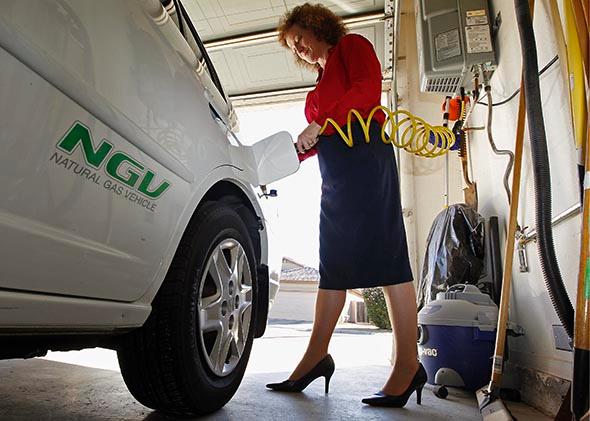A good energy strategy leaves everybody mad.
Greens are nettled that Obama’s “all of the above” approach, first outlined in 2012 and reiterated in his State of the Union speech Tuesday, includes domestic oil drilling and natural gas fracking. Conservatives are steamed that it includes subsidies for solar and wind.
Ahead of the address, 18 environmental groups—including the Sierra Club and the Environmental Defense Fund—had banded together to call on the president to drop the “all of the above” rhetoric, arguing it’s at odds with his stated goal of cutting carbon emissions. Republicans, meanwhile, contended that “all of the above” should entail coming out in favor of the Keystone XL pipeline, which would send oil from Canada’s tar sands to Texas.
What both sides tend to overlook is that “all of the above” is a misnomer—a sleight of hand on the president’s part. Obama’s policy has never been “all of the above.” Rather, it has been primarily about two sources of energy: natural gas and renewables.
Obama had plenty of praise for both in his speech Tuesday night. He touted America’s new status as “a global leader in solar,” promising “a smarter tax policy” that favors renewable energy over fossil fuels. And he extolled natural gas as “the bridge fuel that can power our economy with less of the carbon pollution that causes climate change,” pledging to “cut red tape” for factories that run on it.
Yes, Obama also bragged that the United States is now producing more oil at home than it imports, but for all of his talk of weaning the U.S. off foreign oil, the domestic production boom is not really a product of any particular administration policy. If anything, the president has worked to reduce U.S. demand for oil by raising fuel-efficiency standards for cars, and he proposed Tuesday to extend that push to trucks. And he has been stalling for years on the Keystone pipeline. At best, oil is a neutral factor in Obama’s energy strategy—he’s not really clamping down on drilling, but neither is he doing anything to encourage it.
Nuclear power, meanwhile, did not rate a single mention in Tuesday’s speech. Obama has resisted calls to make a strategic move away from nuclear in the wake of the Fukushima disaster, but he has never made it a key piece of his climate policy, even though it’s by far America’s largest source of carbon-free electricity.
What “all of the above” really means, then, is “everything but coal.” Obama did not actually use the word coal on Tuesday, but rest assured that coal is what he has in mind when he uses words like dirty, pollution, and fossil fuels. And it’s coal that his Environmental Protection Agency has targeted with strict new regulations on carbon emissions from power plants, using its authority under the Clean Air Act. Earlier this month the EPA published rules limiting carbon emissions from new power plants that all but preclude using new coal production in the country’s future. Now the agency is working on tougher standards for existing power plants, which could push coal mines toward the ash heap of American history.
That’s why Republicans and Democrats from mining states have never been fooled by the “all of the above” rhetoric. To them, Obama’s policy has always amounted to a “war on coal,” as Mitt Romney called it. They’re right—and so is Obama. Even as he has avoided saying so, Obama’s war on coal has been the strongest and most consistent facet of his energy and climate policy, and it could end up as a major part of his legacy. Under his watch, the share of U.S. electricity generated from coal dropped from 50 percent in 2007 to just 37 percent in 2012.
Much of that is due to the sudden boom in natural gas fracking, which Obama has tolerated despite cries from the left to slow or stop it until the environmental impacts are better understood. Environmentalists are right to be concerned. Yet it’s that same natural gas boom that allowed Obama to boast on Tuesday that, over the past eight years, the United States has reduced its total carbon pollution more than any other nation on Earth. At the same time, the president’s tacit support for a prominent domestic fossil fuel source has given him some political cover for repeatedly punting on the Keystone pipeline, perhaps the only issue that stirs more passion among green activists than fracking.
And since his re-election victory, in which he relentlessly downplayed his environmental platform, Obama has finally stopped pussyfooting around the issue of climate change. On Tuesday he thundered, “The debate is settled. Climate change is a fact. And when our children’s children look us in the eye and ask if we did all we could to leave them a safer, more stable world, with new sources of energy, I want us to be able to say, ‘Yes, we did.’ ”
A war on coal and a kicking of the Keystone can, coupled with a smattering of clean-energy subsidies and efficiency standards, may not be enough to satisfy environmentalists. It’s certainly not enough to tell our children’s children that we did “all we could.” But, in the absence of any sign that congressional Republicans would ever support a carbon tax or cap-and-trade scheme, it just might be the best that was politically possible.
This article is part of Future Tense, a collaboration among Arizona State University, the New America Foundation, and Slate. Future Tense explores the ways emerging technologies affect society, policy, and culture. To read more, visit the Future Tense blog and the Future Tense home page. You can also follow us on Twitter.
Previously in Slate:
Clean Tech Is Not Dead. In Fact, It’s Booming.
Under Obama, U.S. Leads the World in Oil and Gas Production
Why Are Carbon Dioxide Emissions Down So Much in the U.S.?
Nature Thinks Obama Should Stop Dithering and Approve the Keystone Pipeline
